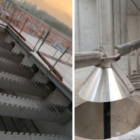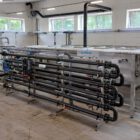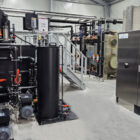A filter press is a mechanical dewatering process used in industrial wastewater treatment and sludge treatment to separate solids from liquids and reduce the water content in sludge. Filter presses work on the principle of pressure filtration, where solids are retained and dewatered by pressing the material against a filter plate or filter cloth. These systems are particularly efficient in the treatment of wastewater and the dewatering of sewage sludge, especially in industries with a high solids content in wastewater.
Table of contents
Technical basics of the filter press
The filter press consists of a series of filter plates covered with filter cloths and a system for generating pressure. The plates are arranged in a frame and the sludge to be treated is pumped under pressure into the chambers between the plates. Due to the combination of pressure and filtration, the solids remain on the filter cloths as filter cake, while the water flows through the pores of the cloths and is collected as filtrate.
Filter presses are often used in plants where a high solids concentration must be achieved, as they effectively reduce the water content of the sludge and thus reduce transportation and disposal costs.
Structure and components of a filter press
A typical filter press consists of the following main components:
Filter plates and filter cloths:
- The filter plates form the main frame of the press. They are either flat or equipped with special grooves that facilitate the drainage of the filtrate. The filter cloths are made of materials such as polypropylene, which are chemically resistant and durable.
hydraulic system:
- A hydraulic pressure system compresses the plates against each other, creating a solid chamber structure. This system generates the necessary pressure to push the water out of the sludge.
Inlet system:
- The sludge is fed into the filter chambers through a pipe system. Depending on the requirements of the process plant, the feed can be continuous or in batches.
drainage system:
- The filtrate that passes through the filter cloths is drained via a drainage system and either returned to the water cycle or sent to the wastewater treatment system.
Automated control (optional):
- In modern filter presses, there is often an automatic control system that monitors and controls the entire filtration process. This includes filling, pressure regulation, filtrate removal and the opening of the plates for unloading the filter cake.
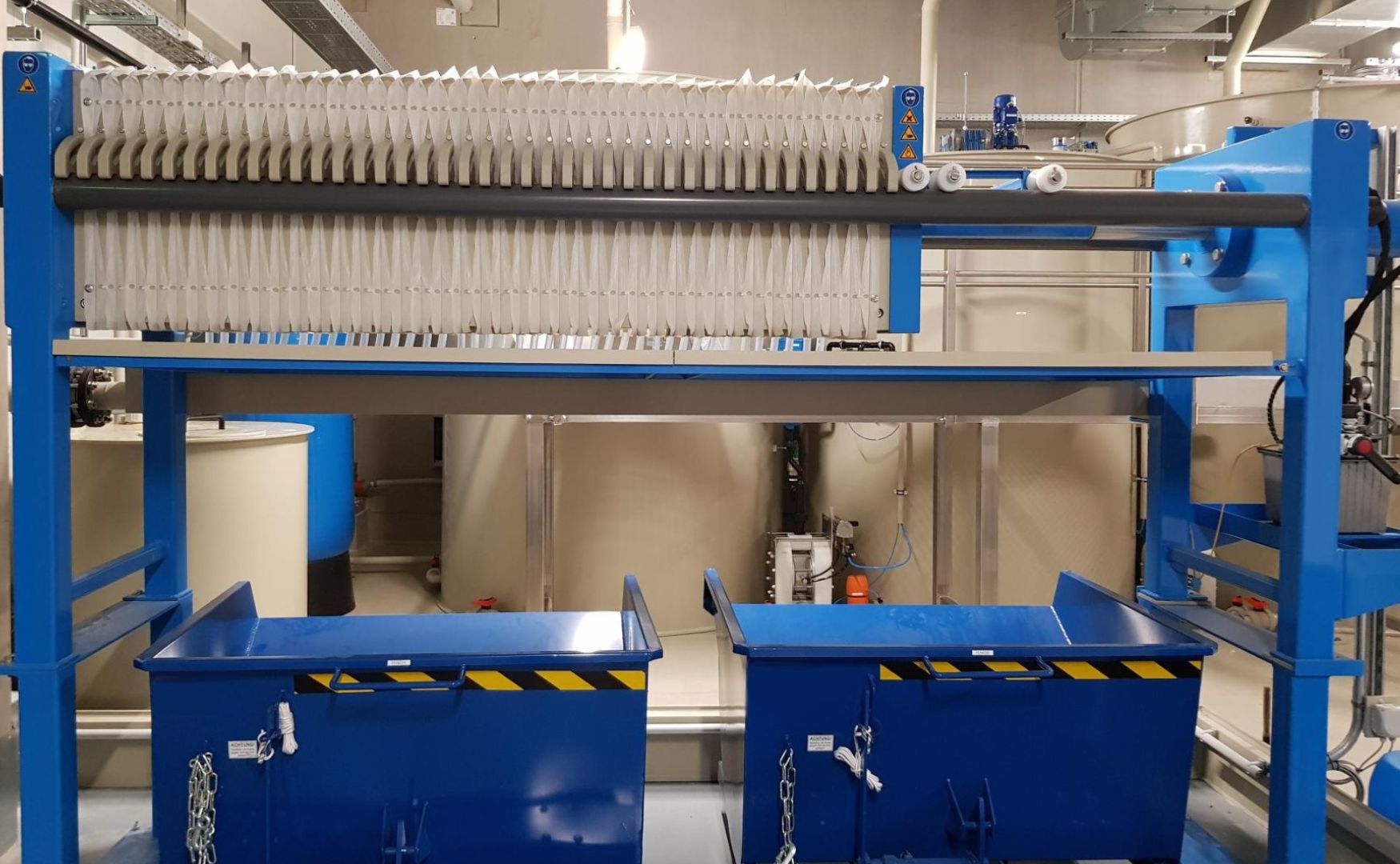
Photo: ALMA CFP chamber filter press for dewatering sludge from CP systems
How the filter press works
The filter press works in a cyclical process that comprises several steps:
Filling the chambers:
- The sludge is pumped under pressure into the chambers between the plates. The solids in the sludge are retained by the filter cloth, while the water seeps through the pores of the filter cloths and is collected as filtrate.
Filtration and pressure build-up:
- During filling, the pressure in the chambers increases, effectively separating the water from the solids. The higher the pressure, the denser and drier the resulting filter cake.
Pressure relief and removal of the filter cake:
- After filtration, the pressure in the filter press is released and the filter plates are separated from each other to discharge the filter cake. The filter cake falls out of the chambers and can be collected for disposal or further processing.
Cleaning and repeating the cycle:
- The filter cloths must be cleaned regularly to keep the pores free of particle deposits. The filtration process then starts again.
Types of filter presses
Filter presses are available in various designs and types to meet different requirements:
Chamber filter press:
- The chamber filter press is the most commonly used type and consists of a series of plates that form solid chambers for filtration. This type is particularly effective for applications with a high solids content.
Membrane filter press:
- Membrane filter presses are equipped with flexible membranes that expand after the main filtration and exert additional pressure on the filter cake. This increases the solids concentration and reduces the water content even further. They are suitable for very moist sludges.
Panel and frame press:
- This variant consists of interchangeable filter plates and frames and is used for special applications. However, it is less common as it has a lower degree of automation compared to the chamber filter press.
Automatic filter press:
- These presses are equipped with automatic systems for filter cake unloading and cleaning, which simplifies operation and reduces operating time.
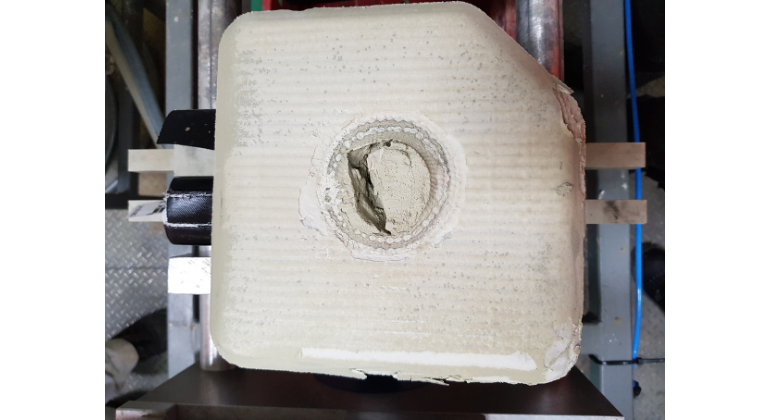
Photo: Photo of a dewatered filter sludge from one of our test chamber filter presses
Pilot tests with your wastewater
To ensure that the filter press is optimally designed for your specific requirements, we offer pilot tests that we can carry out either directly on your premises or in our technical center.
In these tests, we analyze the filterability and degree of dewatering of your wastewater and determine the most suitable filter cloth to ensure optimum detachment of the filter cake and prevent the filter cake from sticking to the filter cloth. We use our precipitation and flocculation plant (CP system) to produce a dewaterable sludge in advance, which is then dewatered in our chamber filter press. This approach enables us to determine the best configuration for your specific application and to design the dewatering process efficiently.
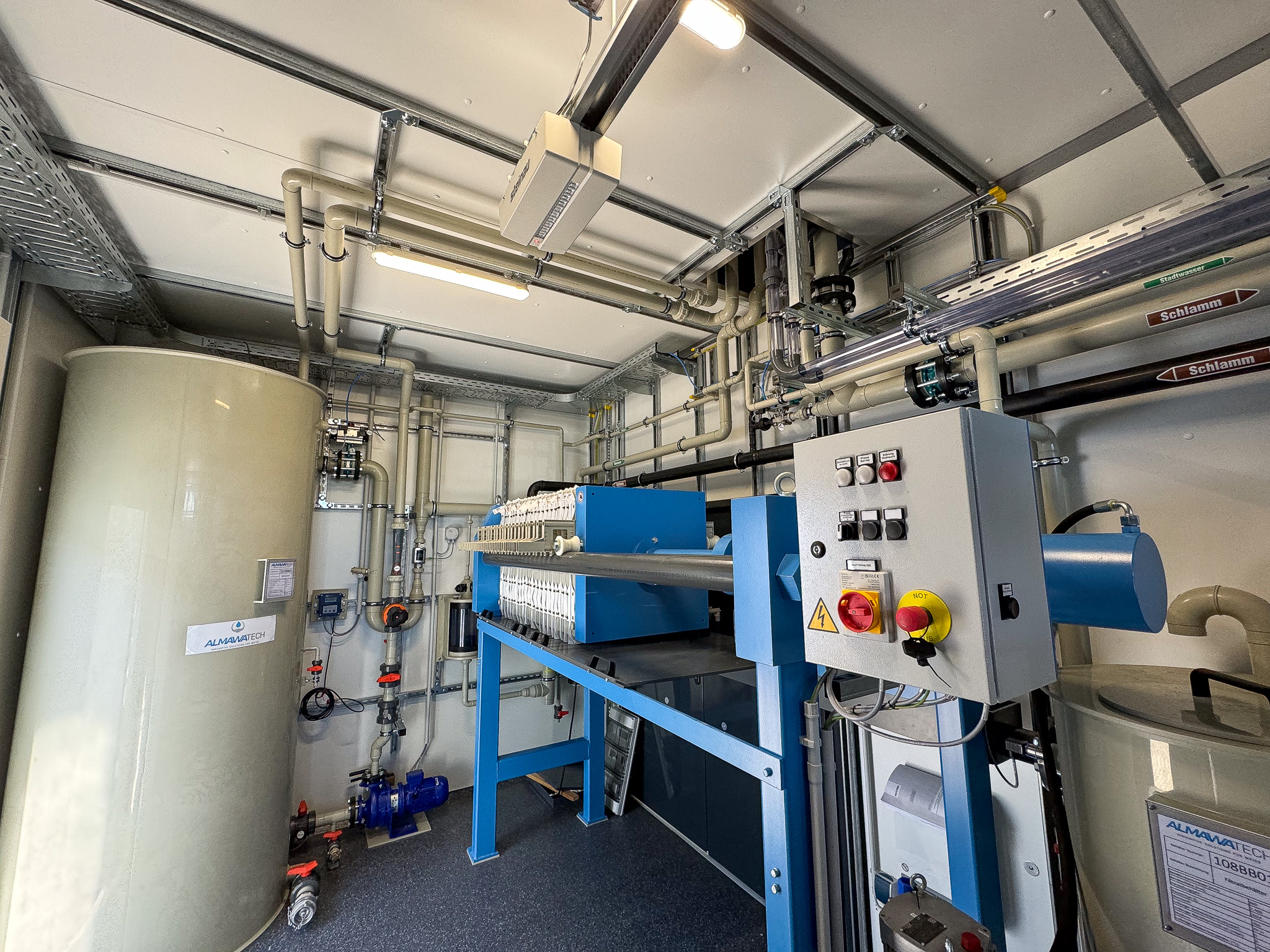
Photo: Our ALMA CFP chamber filter press installed in the ALMA Modul technical room container
Applications and advantages of the filter press
Filter presses are used in various industries for dewatering and solids separation:
Municipal and industrial wastewater treatment plants:
- Filter presses are used here to dewater sewage sludge in order to reduce the volume of sludge and lower disposal costs.
Food and beverage industry:
- This industry produces organic waste, which is dewatered by filter presses to reduce the water content and facilitate waste disposal.
Mining and metal processing:
- Filter presses are used to separate and dewater mineral sludges and ore processing residues. They enable water to be recovered and the volume of waste to be reduced.
Chemical and pharmaceutical industry:
- Filter presses are used here to remove solids from process wastewater and prepare the residual materials for safe disposal or further processing.
Technical advantages of the filter press
High solids concentration:
- Filter presses produce a very dry filter cake, which significantly reduces transportation and disposal costs.
Easy handling and automation:
- Many filter press models offer a high degree of automation, which simplifies operation and shortens cycle times.
Efficient filtration with high solids content:
- They are particularly suitable for applications with high solids concentrations and enable effective separation even with challenging wastewater compositions.
Flexible application options:
- Filter presses can be customized according to requirements and wastewater composition, making them versatile and efficient in a wide range of industries.
Challenges when using filter presses
Maintenance and cleaning of the filter cloths:
- The filter cloths can become clogged with fine particles and must be cleaned regularly to ensure optimum filtration.
High energy consumption for membrane presses:
- Membrane filter presses, which exert additional pressure on the filter cake, have a higher energy requirement.
Use of chemicals to support filtration:
- In some cases, flocculants or filtration aids are required to better bind the solids, which can increase operating costs.
Conclusion
The filter press is an indispensable technology in industrial water and wastewater treatment, as it offers an effective and economical solution for reducing the volume of sludge and separating solids. Thanks to its modular design and different types, the filter press can be adapted to different applications and specific requirements. With the right configuration and regular maintenance, the filter press is a durable and reliable component that minimizes both operating costs and the environmental impact of wastewater and sludge.
For further information on our products, please feel free to contact us at any time!


